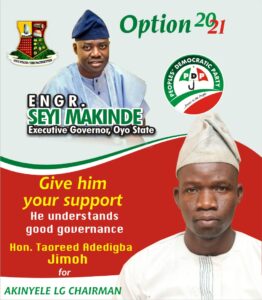LG and Constituency Administration: Factors Determinant to UN- SDGs 2030 Global Agenda by Kunle Yusuff
The capacity to develop inclusive partnerships based on the full involvement and collaboration of Major Groups and other stakeholders, in particular of the Local Government and Constituents are critical to the success of the SDGs.
As stressed by the UN Secretary General in his Synthesis Report on the Post-2015 Agenda, “many of the investments to achieve the sustainable development goals will take place at the subnational level and be led by Local Authorities.

Indeed, Local Governments are at the forefront of tackling most of the issues addressed by the SDGs in our daily work. We have a fundamental role in ensuring the safety, security, livelihoods and wellbeing of our Communities. However, in many cases, policy development at national, regional and global level does not sufficiently take into account how these policies affect sub-national levels where people live and experience global challenges. An effective review and follow-up of SDG implementation worldwide should take into consideration, not only the contributions of each country, but also the specific needs of different cities and regions, to avoid leaving anyone behind.

Local Government Administration’s has responsibilities relating to all of the SDGs, including Sub-National policy-making, Governance and Strategies to ensure implementation and delivery, monitoring and review. The Local authority has the legitimacy to lead inclusive and participatory policy processes to ensure a people-centered approach to development. They are ideally placed to lead local multi-stakeholder partnerships in which public sector, civil society and business actors are involved according to their distinct competencies, capacities and resources. This is essential to create local ownership and mobilizes stakeholders to contribute to the achievement of the SDGs.

The achievement of the 2030 Agenda depends on public policies implemented by Local Government Administration, State Governments, Civil Society Organisations, Development Agencies in localizing SDGs.
Considering the strategic position of Local Governmentand and Constituents, as the level of Government closest to citizens and local stakeholders, and as intermediaries between national and local levels, it will be fundamental to create and develop the necessary enabling environment to allow full role in the achievement of the SDGs on the ground. The 2030 Agenda will only be achieved at subnational level if appropriate institutional architecture and governance models are established to allow a multi-stakeholder and multi-level framework.
An effective multi-level governance framework should take into account the need for coherence, coordination, cooperation and cohesion of national and local government.
Engagement with civil-society and multi-stakeholders Promotes multi-stakeholder and multi-sectoral coordination mechanisms at subnational level. Identify needs and shared priorities within communities and territories through a participatory process. This could be particularly helpful to identify vulnerable groups and address their problems.
The world has changed since the adoption of the Millennium Development Goals fifteen years ago. Around 54% the world’s population now live in cities and urban settlements, and this percentage is expected to increase to 66% by 2050 (UNDESA, World Urbanization Prospects 2014). The transformation is particularly relevant for
Africa and Asia, where 90% of urban growth will be concentrated over the coming decades.
Sustainable urbanization in Local Government is now recognized as a crucial issue for the achievement of the SDGs. Beyond the urban Goal 11, this massive urban transformation will determine the achievement of the majority of the goals and targets of the 2030 Agenda (around 65% of targets and 157 indicators require Local Government, Private Sector and Civil Society Organisations Involvement and Investments.
The Decentralization strategy adopted by Governor Seyi Makinde, particularly on State Agribusiness Initiatives, Housing Corporation and State Investment Ageny shows that Oyo State has key into SDGs UN- Habitat Principles and SDGs Addis- Abba Agreement Action Agenda.
In this context, the Local Authorities Major Group is involved in the aforementioned Global Taskforce of Local and Regional Governments, a unique platform to mobilize and organize our constituency and make joint recommendations for Habitat III and to support the implementation of the 2030 Agenda.
Kunle Yusuff MON is the Senior Special Assistant to Governor Seyi Makinde on Sustainable Development Goals.

